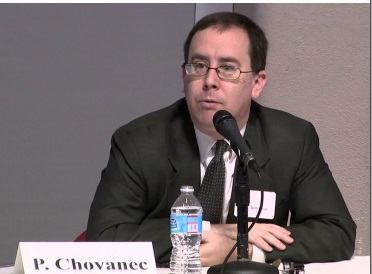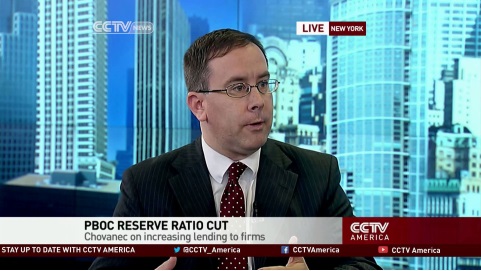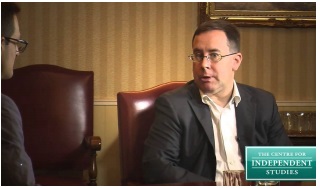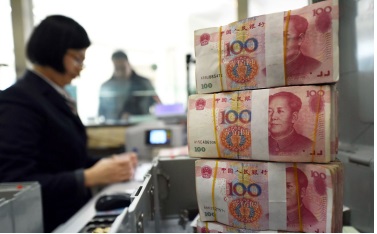Reforms to make the economy boom again
Talking with Patrick Chovanec,
A well known financial strategist
By Mike Cormack

Patrick Chovanec is in much demand as an expert on Chinese economy. Formerly a professor at Tsinghua University and a much-quoted blogger, he now works as a financial strategist in between his media work. He spoke in exclusive to Business Tianjin about Chinese growth, debt and the reforms that could see the economy boom again.
What first brought you to China in 1986?
I first came in 1986 with my family, when I was 15 years-old. We saw China at a very interesting point when it was just beginning to open up. It looked very different to what it does today. I don't think there was a single building in Shanghai that was taller than 20 storeys. Then I came back and travelled a great deal through China in the 1990s, as a backpacker. Then in 2000 I came with Institutional Investor Magazine to run their Asia Pacific Institute which was basically a group of financial executives posted throughout Asia. Eventually I went to London and did another thing with Institutional Investor but came back to work in private equity in China and did that for several years with a number of different firms. Then in 2008 the opportunity came up to teach at Tsinghua University and I taught in their business school for five years.
 What was China like in that early 90s period?
What was China like in that early 90s period?
For me the big change was between 1986 and 1992. That was where it changed from being a country that looked a lot like North Korea. When I went to North Korea in 2008 it really brought back a lot of memories of China in the 1980's. On the streets there was no advertising, no shops, everyone dressed in similar clothing, with similar haircuts.
When I got back in 1992 and travelled around China I actually first entered through Tibet. It looked sort of similar to the China that I remembered. Then I flew to Chengdu and it was completely different, especially the clothing people wore, their hairstyles, and people selling things on the street. We saw a little bit of that in 86 down in the south in Guangzhou. You saw street peddlers but by the 1990s it had really taken shape. They had just opened the stock market, you saw the beginnings of the first private company being established and it was really quite something.

How would you describe your relationship with your Tsinghua students?
I was teaching at Tsinghua University about doing business in America and American Business History. There was a lot of curiosity; it was a big challenge for a lot of companies in China to go global. The American business history was less directly related to the media challenges that my students were faced with. It was fascinating, I remember students coming up to me after I'd given a talk on the development of retail in the US over the course of many decades and saying to me "That's what's happening in China right now!". I would say "You're right, exactly!" It was always very rewarding when they would see the similarities.
Now I work for Silvercrest Assest Management as their chief strategist. We manage money on behalf of wealthy families; it's a publicly listed company in the US (we manage about 18billion dollars). My job is not China focussed, although China is always an important part of the equation. I've been doing a lot of travelling to a lot of different places outside of China. I've just got back from Chile, but I still seem to talk about the same kinds of things I did when I was in China. China is a big part of any outlook on the global economy.

Both you and Michael Pettis were writing about a slow-down in the Chinese economy years before it came about. What are your own predictions for GDP growth?
I'm not a fatalist when it comes to what China's GDP growth has to be. I think what we are seeing is that China trying to squeeze more and more out of the existing growth model. We have seen a little bit of a bounce this year. We saw for almost two or three years the manufacturing survey in China has been below 50, suggesting contraction, but that bounced a little bit above 50 near the end of the year. What we're clearly seeing is a continued slow down and strangulation of growth. The growth we do see is reliant on greater and greater debt levels, which have not slowed down. In a closed financial system, that doesn't result in a sudden breakdown. You can socialise the losses, you can sweep them under the rug. A lot of people expect a Lehman moment, but we may not ever get that. That's part of the problem - there's no correction. So I think outside of China people tend to be schizophrenic about it because they don't have a narrative to explain why the slowdown is taking place.
Occasionally I get chided by people who call me a China bear and who say the economy is doing fine. We may not get the timing right, but you can point to a number of problems weighing down on Chinese growth which they will continue to do so for the foreseeable future. No, China didn't collapse - but nobody serious said that would happen. I didn't move to China because I thought it was a basket case. I went there because there was an economic miracle going on. But starting in 2008 a few of us began to recognise there were some serious imbalances too, and there was going to be a reckoning one way or another. Predicting how or when is very difficult, but people are recognising that the things that we talked about have become very serious issues.
 The RMB has been steadily declining, but has seen some remarkable gyrations. Can you explain what's happening?
The RMB has been steadily declining, but has seen some remarkable gyrations. Can you explain what's happening?
The reason why most countries face downwards pressure on their currencies is because they're running chronic trade deficits and for one reason or another can't sustain them. China's situation is the exact opposite - it runs chronic trade surpluses and needs to make an adjustment to lessen savings, lessen investment and lessen reliance on external demand, a more balanced reliance on consumption to drive growth. Its failure to do that has caused investment returns in China to decline. It's hard to measure because so many losses are socialised. But clearly many people are intent in taking at least some of their money out of China and putting it somewhere else.
We've seen China go from importing currency through trade surpluses and being a net recipient of investment to exporting currency due to all of the capital flowing out of the country. Its capital flows are the result of a failure to rebalance and that's what has caused pressure on the RMB. That's why I don't think China needs to depreciate its currency, because you can't get ahead of what's pushing the money out the country. If you have a weaker Chinese currency, all that does is it causes people to invest more, save more and consume less. So China needs to defend its currency, draw down on its reserves, and transform those savings into consumption. But the capital outflow problem has been worsened by China allowing a gradual depreciation, because that convinces everyone that it's what's going to happen and that they should get their money out before it does.
The US has not come with up with a clear message, and neither has the IMF or the G20, about what they want China to do, and how they'll help China do it. What they need to do is to help China. There are a lot of things the G20 or the US or the world central banks could do to send a message that they are supportive of China holding the line on its currency. But that has to be connected with real reform, because at the end of the day, you've got to solve the real problem that capital wants to leave China because there are low returns due to imbalances there.
The answer to that is either that you have a big devaluation and you shore it up by providing external demand from the rest of the world, but that's not really a long-term answer, or you have a real adjustment in China's economy. So far we have not seen China bite the bullet on that. This isn't the US and everyone complaining that China's can't run surpluses, it's unfair. This is what China itself needs to do.
What can the People's Bank do?
The reality is that China has to decide to support the currency or not, whether that is a policy which pushes the Chinese economy in the right direction and what kind of resources they have to do it. It is much better to reach out to the rest of the world than it is to slap capital controls on. Capital controls are not really - like any kind of intervention, it pretends to solve the problem when it hasn't. So slapping capital controls on and preventing money from moving abroad is really only the most temporary solution. What they have to do is the opposite - by making China more attractive for investment, for inflows. Capital controls don't solve anything. China has to rebalance its economy, make it more attractive for domestic and foreign money to want to go to China and stay in China.
I don't see much rebalancing taking place. If there is no reform, a lot of money that China has accumulated from real wealth creation and by producing more than it consumes will simply leave the country. It won't be spread amongst the Chinese people; it will leave in the form of savings of wealthy individuals. What the world needs is not a lot of wealthy Chinese people buying property in Manhattan or Vancouver, it needs the average everyday Chinese people buying products from around the world to improve their lives. That could actually be a major driver of growth in the world. But if capital simply leaves China in the form of wealthy people's savings, China suffers and while the money eventually translates to demand in the rest of the world, it's not in the way that's needed.
China's ODI is growing at 50% year-on-year. What's happening there?
Part of it is just the healthy development of Chinese economy, a number of companies have reached the size and scale that it makes sense to think of making investments abroad. Some of it also reflects the imbalances - when you run chronic trade surpluses you accumulate capital and you look for productive investments for it. To the extent -and this is less healthy- that the domestic market is looking less attractive, particularly for real estate companies, it's because things are very volatile at home and they think they can make more money abroad. The money flows to where there are more positive returns or where they think there are.
What's your feel for what's actually happening on the ground in the provinces?
The authorities know the model has reached its sell-by-date, but the reality is it's hard to walk away from. There are areas of potential real growth in the Chinese economy, but they can't be tapped unless there are price signals that send resources in a different direction. In healthcare, in agriculture, in services, in logistics, there are a huge number of areas where China can realise real gains. If you go back to last debt crisis in China in 2000, it was serious. There were huge inefficiencies in state-owned enterprises, there was a big bad debt problem, but it didn't translate into a collapse. Why? It wasn't because these problems weren't real; they were just eclipsed by other things that were happening. You had massive privatisations of small and medium SOEs, the creation of a private property market, which was a big growth driver. You had real reform of the banks. There was also China joining the WTO, and opening up huge chunks of its economy to competition. All of these things created real growth that overshadowed a lot of those problems.
The same has been true about this debt crisis. There are real reforms that could have and should have been done years ago, but there are lots of areas of the Chinese economy that could really take off and generate real gains. But that means letting things fail. And if you can't let things fail, people never get the signal to send money in a different direction. The problem with bubbles is not just that prices go up and then they go down and people lose their shirt, it's that they suck the oxygen out from more productive activities. I'm not bearish on China in that I think growth has tapped out. If anything I'm frustrated because there are so many areas where I think they could really grow. But it's not happening because they're locked into a pattern of growth that's long since past its sell-by date. It's not willing to accept the process of creative destruction that would channel resources more productively.
Similarly, is the "Li Keqiang index" still a useful guide alongside GDP data, or has it too become distorted?
It's an interesting exercise. It's obviously focused more on the industrial economy in China and so it'll tell you more about that. The Index tells you what it tells you - about energy use, about credit, and things like freight. But they're not the real economy and we need to recognise that. What the LQI did tell you over the past several years that what had been growth drivers were really hurting and were really contracting. But did it tell you about, say, Alibaba and the growth of ecommerce? No.
What's your sense of how Trump will affect the world economy and particularly Sino-US trade?
Trump, like us, believes that the chronic US trade deficit is a problem and that the imbalances that exist are not healthy. But we believe that the trade deficit is down to deep-seated imbalances in the US and Chinese economies and the way to address that is to solve these imbalances. Trump believes it's because of bad trade deals. He thinks the answer is to bang your fists on the table to get a better deal. There were $650 billion worth of trade between the US and China in 2015. More of that were imports to the US than exports, but Americans are consumers as well as producers. American consumers suddenly cut off from the supply chains that give them access to a whole range of goods could face a very serious price check.
If you go back the 1980s Trump has very consistently been critical on trade. He said the same things about Japan then and he still says them now. If you listened to his inaugural address, it was pretty hard line - saying that other countries have "ravaged" the US economy and that "America First" was going to be the guiding principle. This does not sound like a guy pivoting from campaign rhetoric to a more moderate form of governing. We're going to have to see what specifically he does. I think China is taking a wait-and-see approach to what Trump does. Now he is president, he does things, or doesn't do things, and that has consequences.
--- END ---